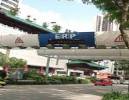Factsheet Jan 2009
Author: Fani Rachmita
Factsheet Dec 2008
Factsheet Feb 2009
The Institute for Transportation and Development Policy (ITDP), in coordination with Jakarta Government, completed the third semester (January – June 2008) of the 5-year implementation period for the “Bus Rapid Transit and Pedestrian Improvements Project in Jakarta” (IMIS: GFL/2328 – 2723 – 4960) funded by the Global Environment Facility (GEF) – United Nations Environment Programme (UNEP). The project is being implemented to reach the overall objective to maximize the effectiveness of the Jakarta bus rapid transit (BRT) or busway.
Busway Schematic Map (2007) NEW ! Macro Transportation Scheme (pdf, 2 MB) Busway Koridor 1 (Blok M-Kota) Busway Koridor 2 (Pulogadung-Harmoni) Busway Koridor 3 (Kalideres-Harmoni) Busway Koridor 4 (Pulogadung-Dukuh Atas) Busway Koridor 5 (Kampung Melayu-Ancol) Busway Koridor 6 (Ragunan-Kuningan) Busway Koridor 7 (Kp.Rambutan-Kp.Melayu)
Conducted on December 7-8, 2006 in Jakarta, Indonesia, with the following partners : Ministry of Transportation , Indonesia GTZ-German Technical Cooperation, SUTP Project Institute of Transport Development and Policy (ITDP) PUSTRAL UGM – Pusat Studi Transportasi dan Logistik Indonesian Transportation Society (MTI) Click here to browse course presentations
In a growing number of cities, congestion pricing has dramatically cut traffic, congestion, and pollution while raising revenue to improve public transportation. ITDP and Environmental Defense recently organized several workshops in Indonesia to brief key decision-makers, planners, and professionals who are exploring congestion pricing in Jakarta and other cities in Asia and beyond. The experience…
 Traffic in Jakarta is dominated by private cars and motorcycles. Refer to information from Jakarta Transportation Agency, the growth of new vehicle is 11% per-year, while infrastructure is only expanded by 1%. Besides that, JICA Study on Integrated Transport Master Plan (SITRAMP, 2003) indicated that more than 1.3 million vehicles movement per day from and to surrounding cities around Jakarta. These situations caused heavy traffic congestion especially during peak hours and created severe air pollution. SITRAMP study estimates that traffic congestion in Jakarta costs around USD 1.4 billion per-year (exclude health impact cost from traffic air pollution). Therefore Jakarta needs a policy that restricts the number and usage of private car to prevent worsened traffic congestion.
Traffic in Jakarta is dominated by private cars and motorcycles. Refer to information from Jakarta Transportation Agency, the growth of new vehicle is 11% per-year, while infrastructure is only expanded by 1%. Besides that, JICA Study on Integrated Transport Master Plan (SITRAMP, 2003) indicated that more than 1.3 million vehicles movement per day from and to surrounding cities around Jakarta. These situations caused heavy traffic congestion especially during peak hours and created severe air pollution. SITRAMP study estimates that traffic congestion in Jakarta costs around USD 1.4 billion per-year (exclude health impact cost from traffic air pollution). Therefore Jakarta needs a policy that restricts the number and usage of private car to prevent worsened traffic congestion.
